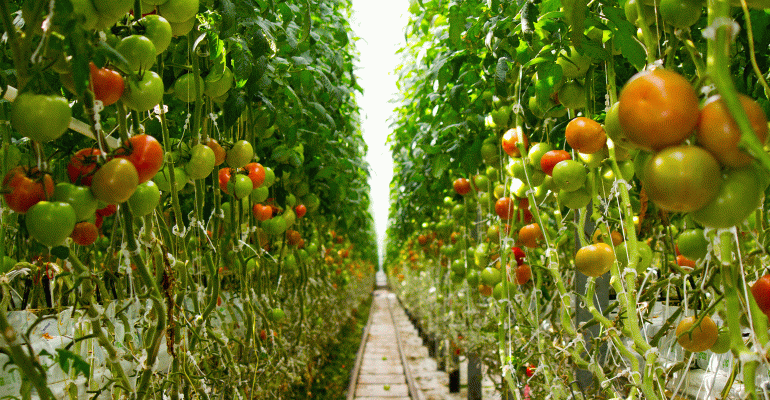The Wendy’s Co. is a quarter of the way toward its ultimate goal of sourcing all its tomatoes from North American greenhouse farms by early 2019, the company said Wednesday.
 “About 25 percent of our tomatoes are coming from vine-ripened, greenhouse farms today,” Liliana Esposito, left, chief communications officer and leader of the quality assurance team for the Dublin, Ohio-based burger chain, said in an interview.
“About 25 percent of our tomatoes are coming from vine-ripened, greenhouse farms today,” Liliana Esposito, left, chief communications officer and leader of the quality assurance team for the Dublin, Ohio-based burger chain, said in an interview.
“Between now and the end of the year we will fully transition,” she added. “It may bleed a little into the first quarter of next year.”
Wendy’s uses millions of pounds of tomatoes each year, a company spokesperson said, with sliced tomatoes in the brand’s premium sandwiches and cherry and diced tomatoes in salads.
The announcement came the same day as Wendy’s shareholder meeting and a protest by the Coalition of Immokalee Workers, which has been protesting and pressing the burger brand to join the CIW’s Fair Food Program, established in 2005 to provide supply-chain certification that tomato field workers were not being exploited.
Wendy’s has not participated in the FFP, which such large national restaurant companies and McDonald’s Corp., Subway and Taco Bell Inc. have signed and agreed to pay a penny-per-pound premium to benefit field workers.
“If anything, that activity was mostly spurred by our moving to a more vine-ripened product rather than the more conventionally mature green product,” Esposito said. “That [decision] was driven by weather events and supply. … It has taken several years for that to become a reality.”
The company’s move to a dozen or so greenhouse tomato farms will allow Wendy’s to get quality, year-round production closer to its 6,100 restaurants in the United States and Canada, Esposito said, rather than depending on outdoor farms, where the production in winter months is mostly in Florida and Mexico, Esposito said.
“We don’t have any issue with their product,” she said. “It’s just not the product we are buying today.”
Marley Moynahan, a spokesperson for the CIW, said Wendy’s announcement was a "partial victory."
"The few greenhouse growers that exist today are not part of the FFP, and so there is simply no way their workers can enjoy the high bar of human rights protections that workers on FFP farms enjoy today," Moynahan said in a statement.
Esposito said Wendy’s had identified its new suppliers, which in some cases included existing tomato producers that are transitioning to greenhouse production.

“We’re finalizing the specific arrangements with each of these suppliers — there’s about a dozen of them — and logistically making sure that network around the U.S. and Canada is set up as close to our restaurants as possible,” she said.
At least two of the dozen greenhouse producers will be in Canada.
Because the consistency of taste and texture can vary significantly with outdoor tomato farming, the move to greenhouse product will provide a better menu item, Esposito said.
“First and foremost, the advantage for the consumer is the taste and quality of product,” she said. “One of the challenges that we see in supplying tomatoes for a chain as large as we are is that the same product has to get to all of our restaurants at least twice a week, regardless of what is happening with the weather and the growing trends.”
A vine-ripened product will also provide an environmental benefit, Esposito said.
“We love the sustainability benefits that come with this,” she said. “These operations tend to be far more efficient in their use of water.”
In the past, Wendy’s has sourced tomatoes according to season. Typical tomato purchasing in the May-to-October summer season moved up the East Coast with some sourcing in California and Mexico. In the October-to-May winter season, tomatoes came from Florida and Mexico.
“The number of places where we harvest will change,” Esposito said. “This is just the first step. We will continue to look for ways to bring this type of produce into our restaurants.”
The transition to greenhouses will also smooth operations for the Wendy’s quality assurance division, Esposito said, which no longer will have to follow the migratory harvest. That will require less travel for their audit and testing protocols, she said.
"Greenhouse farms provide supply predictability and quality assurance benefits —including continuity of supply; protection of crops from harsh weather; safe, indoor growing conditions; and a significant reduction of chemical pesticides used on the plants,” Dennis Hecker, Wendy’s senior vice president of quality assurance, said in a statement.
Wendy's, founded in 1969, has 6,633 restaurants worldwide.
Contact Ron Ruggless at [email protected]
Follow him on Twitter: @RonRuggless
Update: June 6, 2018 This story has been updated to include comments from the Coalition of Immokalee Workers spokesperson.





